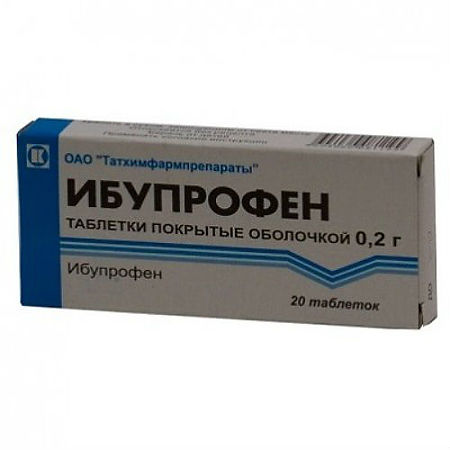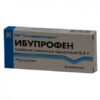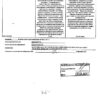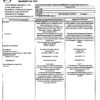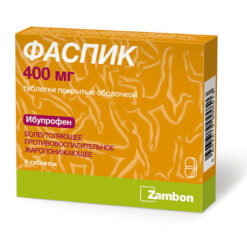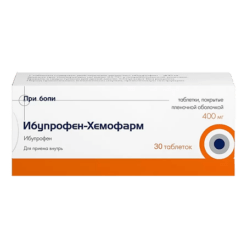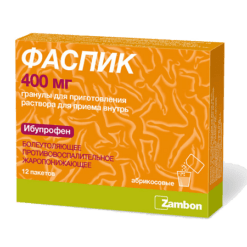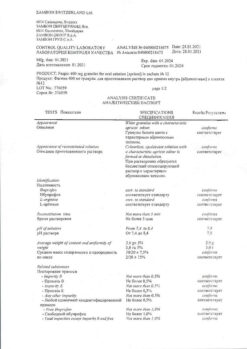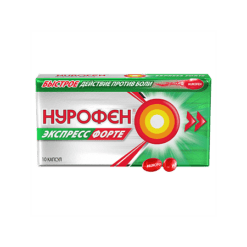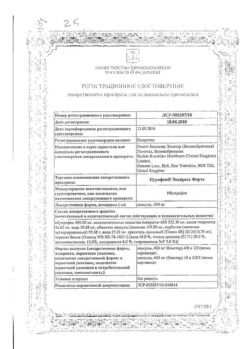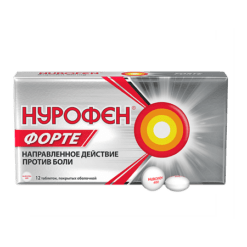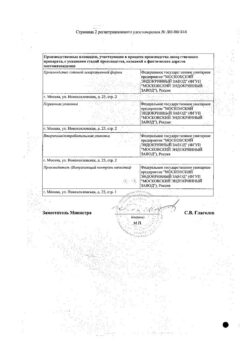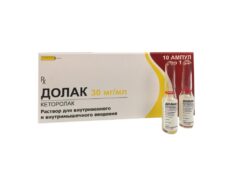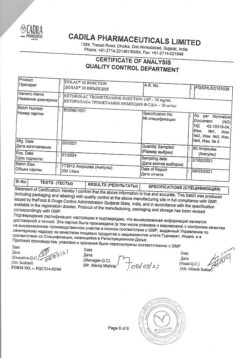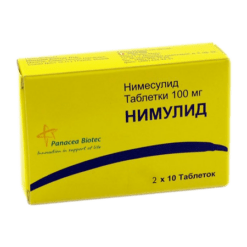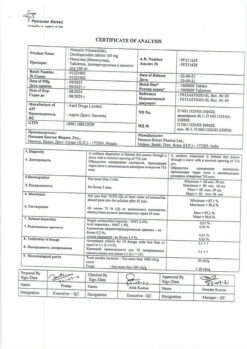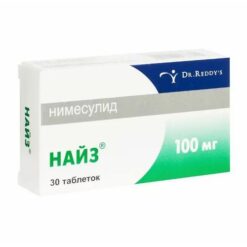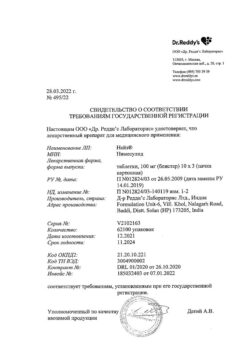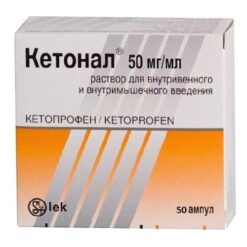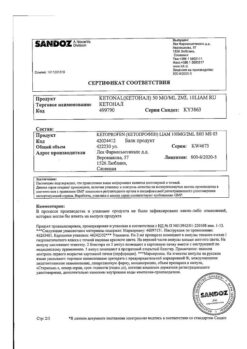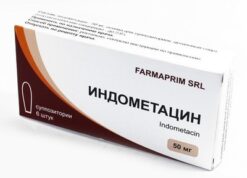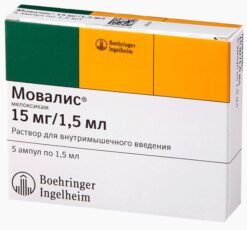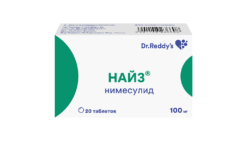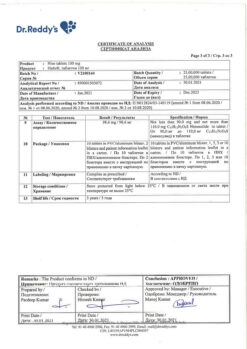No products in the cart.
Ibuprofen, 200 mg 20 pcs
€4.82 €4.02
Description
Pharmgroup:
NSAIDs.
Pharmic action:
PNP; has analgesic, antipyretic and anti-inflammatory effect due to indiscriminate blockade of COX1 and COX2 and has inhibitory effect on Pg synthesis.
The analgesic effect is most pronounced in pain of inflammatory nature. Like all NSAIDs, ibuprofen has antiaggregant activity.
Indications
Indications
Inflammatory and degenerative diseases of the musculoskeletal system: rheumatoid, juvenile chronic, psoriatic arthritis, osteochondrosis, neuralgic amyotrophy (Personej-Turner disease), arthritis in SLE (in complex therapy), gout arthritis (in acute gout attack quick acting forms are preferred), ankylosing spondylitis (Bechterew disease).
Pain syndrome: myalgia, arthralgia, ossalgia, arthritis, sciatica, migraine, headache (including in menstrual syndrome) and toothache, in cancer, neuralgia, tendinitis, tendovaginitis, bursitis, neuralgic amyotrophy (Pearsonage-Turner disease), post-traumatic and post-surgical pain syndrome accompanied by inflammation.
Algodysmenorrhea, pelvic inflammatory process, including adnexitis, childbirth (as an analgesic and tocolytic agent).
Fever syndrome in “colds” and infectious diseases.
Prescribed for symptomatic therapy, to reduce pain and inflammation at the time of use, has no effect on the progression of the disease.
Active ingredient
Active ingredient
Composition
Composition
1 tablet contains:
the active ingredient:
biprofen 200 mg
How to take, the dosage
How to take, the dosage
Ibuprofen is taken orally after meals. The dosage regimen is prescribed individually depending on the indication.
Adults and children over 12 years of age are usually prescribed the drug in an initial dose of 200 mg 3-4 times a day. In order to achieve rapid therapeutic effect the dose may be increased to 400 mg 3 times a day. Once the therapeutic effect has been achieved, the daily dose is reduced to 600-800 mg.
According to the doctor’s recommendation, in osteoarthritis, psoriatic arthritis and ankylosing spondylitis – 400-600 mg 3-4 times a day. In rheumatoid arthritis – 800 mg 3 times a day; in soft tissue traumas, ligament injuries – up to 2.4 g/day in several intakes. In primary dysmenorrhea – 400 mg 3-4 times a day; in moderate pain syndrome -1.2 g/day.
In juvenile rheumatoid arthritis 30-40 mg/kg/day in several doses.
Interaction
Interaction
Ibuprofen may increase plasma concentrations of methotrexate, lithium and digoxin when used simultaneously with these drugs.
Ibuprofen, as well as other nonsteroidal anti-inflammatory drugs (NSAIDs) may decrease the effect of diuretics, calcium channel blockers, ACE inhibitors and other hypotensive drugs, which is associated with impaired prostaglandin synthesis in the kidneys. Concomitant use with potassium-saving diuretics may increase the level of potassium in the blood (if such a combination of drugs is necessary, plasma potassium level should be monitored).
There have been reports of an increased risk of bleeding in case of combined use of ibuprofen and anticoagulants, fibrinolytic agents.
In co-administration with antidepressants, barbiturates, zixorin, rifampicin, phenylbutazone, phenytoin the risk of severe intoxication increases due to increased production of hydroxylated active metabolites of ibuprofen.
Ibuprofen increases the hypoglycemic effectiveness of oral hypoglycemic agents, which requires adjustment of the dose of these drugs against the use of ibuprofen.
Glucocorticoid and mineralcorticoid hormones and colchicine increase the anti-inflammatory effects of ibuprofen and increase the risk of gastrointestinal damage.
When co-administered with cefamandole, cefoperazone, cefotetan, valproic acid and plikamycin, the risk of hypoprothrombinemia increases.
Cyclosporine and gold drugs increase the nephrotoxic effects of ibuprofen.
Ibuprofen increases the undesirable effects of estrogens when used together.
Ibuprofen weakens the effectiveness of the urecosuric effect of antipodagric agents.
Colestyramine slows absorption of ibuprofen.
Caffeine increases the analgesic effect of ibuprofen.
Ibuprofen increases the toxicity of ethanol.
When used together, acetylsalicylic acid weakens the effect of ibuprofen and increases its toxicity, this is due to displacement of ibuprofen from protein binding and its metabolism to form toxic hydroxylated metabolites.
Special Instructions
Special Instructions
Persons with gastrointestinal pathology. During the use of ibuprofen it is necessary to closely monitor the patients with gastrointestinal complaints, history of gastrointestinal ulcers, as well as ulcerative colitis or Crohn’s disease. Against the background of ibuprofen use in this group of patients, gastrointestinal bleeding or gastrointestinal ulceration/perforation may occur (first or repeated), which may not be accompanied by precursor symptoms. In all such cases, the drug should be withdrawn.
Persons with abnormalities of the blood system. Ibuprofen temporarily inhibits platelet aggregation, therefore, in patients with hemostasis disorders, careful monitoring of relevant laboratory parameters is necessary. With long-term use of ibuprofen systematic monitoring of peripheral blood is indicated.
Persons with liver disease. During the use of ibuprofen transient increase in the activity of liver enzymes is possible. During long-term therapy with ibuprofen as a precautionary measure, laboratory monitoring of liver function is indicated. If functional abnormalities persist or intensify, as well as if there are clinical manifestations of other liver lesions, ibuprofen should be discontinued. It should be remembered that hepatitis against the background of ibuprofen use may occur without prodromal manifestations.
Persons with pathology of the cardiovascular system. Since prostaglandins play an important role in maintaining normal renal blood flow, special caution is required when using ibuprofen in patients with renal dysfunction and chronic congestive heart failure, in persons receiving diuretics, as well as in patients with a significant decrease in circulating plasma volume (for example, before and after massive surgical interventions). In all these cases, monitoring of renal function is recommended as a precautionary measure. Discontinuation of the drug usually leads to restoration of renal function to the initial level.
Influence on laboratory values. If it is necessary to determine 17-ketosteroids in the urine, ibuprofen should be discontinued 48 hours before the test.
Impact on the ability to drive and operate machinery. During the use of ibuprofen it is necessary to refrain from all activities requiring increased attention, rapid mental and motor reactions.
It is not recommended to take ethanol during treatment.
Cherry and currant juice and sugar syrup increase the rate of absorption of ibuprofen.
To reduce the risk of gastrointestinal adverse events, the lowest effective dose should be used for the shortest possible course.
Contraindications
Contraindications
Hypersensitivity to any of the ingredients in the drug. Hypersensitivity to acetylsalicylic acid or other NSAIDs in the history.
Erotic ulcerative diseases of the gastrointestinal tract (including acute gastric and duodenal ulcer, Crohn’s disease, nonspecific ulcerative colitis).
“Aspirin” asthma.
Hemophilia and other clotting disorders (including hypocoagulation), hemorrhagic diathesis.
Hemorrhages of any etiology.
Deficiency of glucose-6-phosphate dehydrogenase.
Pregnancy (III anitrimester), lactation period.
Children under 12 years of age.
Ecular nerve disease.
Side effects
Side effects
Overdose
Overdose
Symptoms: there is no typical clinical picture in ibuprofen overdose. Abdominal pain, nausea, vomiting, dizziness, lethargy, drowsiness, depression, headache, hypotension, seizures, heart rhythm disorders, acute renal failure, respiratory depression may occur.
Treatment: treatment measures include discontinuation of the drug, supportive and symptomatic therapy aimed at eliminating the resulting disorders, correction of acid-base status. It is possible to perform forced diuresis with simultaneous administration of alkaline drinking, activated charcoal, to reduce ibuprofen reabsorption.
There is no specific antidote. Gastric lavage is effective only within one hour of taking the drug.
Similarities
Similarities
Additional information
| Weight | 0.019 kg |
|---|---|
| Shelf life | 3 years |
| Conditions of storage | In a dry, light-protected place |
| Manufacturer | Tatkhimpharmpreparaty, Russia |
| Medication form | pills |
| Brand | Tatkhimpharmpreparaty |
Other forms…
Related products
Buy Ibuprofen, 200 mg 20 pcs with delivery to USA, UK, Europe and over 120 other countries.

